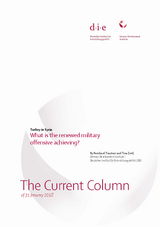Turkey in Syria
What is the renewed military offensive achieving?
Trautner, Bernhard / Tina ZintlThe Current Column (2018)
Bonn: German Development Institute / Deutsches Institut für Entwicklungspolitik (DIE), The Current Column of 31 January 2018
Bonn, 31 January 2018. Barely has so-called Islamic State (IS) been militarily defeated in Iraq and, for the most part, in Syria, and Turkey is once again escalating the old conflict over the Kurdish people in its immediate border region. Yet it was the Kurds that not only stopped IS expanding further in Iraq, succeeding literally at last minute, but also defeated the terror group at the cost of their own lives, working together with an international military coalition that primarily provided air support. While it was the deep-seated fear in Turkey of a “terrorist” Kurdish state on its southern flank that led to the current ground offensive, it is doubtful whether this offensive is actually promoting Turkish interests in the long term. Even before the expansion of IS, islands of relative stability had already emerged amidst the chaos of the proxy wars in the Kurdish regions of Iraq and Syria since the Arabellion (2011) and the US intervention in Iraq (2003). There, in the Kurdish enclaves in northern Syria (also known as “Rojava”), unnoticed by the international public, a new Social Contract is being implemented that gives cause for optimism, and that despite massive weaknesses in its implementation. Unlike many Kurds in Iraq, this movement is not striving to achieve national independence, but rather emancipation and inclusion as part of a controlled decentralisation process in order to bring about peace within society. Is a federal system, based on the Social Contract negotiated in Rojava, viable and desirable? This is something that must be left to the Syrians alone to decide. Instead, NATO partner Turkey, with Russian approval, is not only bombing away this option for long-term stability but also destroying the relative stability that currently exists and thus causing more people to flee their homes and become displaced. As well as being explosive at international law and security policy level, Turkey’s present military offensive is harming development policy considerations and Syria’s post-conflict reconstruction. The Kurdish people’s own initiative in negotiating a Social Contract that is cross-sectarian and inter-ethnic and thus viable within society could serve as a starting point for a future federal Syrian state. However, this initiative is being systematically punished. The development policy creed that societies should be helped to help themselves is being trampled underfoot here. By rushing ahead in this way, Turkey is ending up diametrically opposing its own longer-term interests rather than promoting lasting peace on its southern flank. The military offensive, most likely not intended to involve a permanent presence, threatens to further distance Turkey from its Western partners, with unforeseeable consequences for NATO, Syria and Turkey itself. The offensive is the latest in a series of attempts by the Turkish Government to counter a number of threat scenarios, some of them real, but most of them self-fulfilling counter-reactions. They are all based on the same outdated narrative of Kurdish terrorism. Where Erdogan negotiated not all that long ago with the leader of the Turkish Kurds and Abdullah Öcalan, who he now once again derogatively refers to as “chief terrorist”, on genuine Kurdish autonomy, he now once more considers even civil Kurdish parties like the HDP to be terrorists. Groups such as the PYD, dominant in northern Syria, are considered to be little more than the extended arm of the PKK. This largely unconvincing narrative is based on fear of the potential appeal of a Kurdish model that might just work. With this change of perspective, Erdogan is closing himself off from options that could save Turkey from becoming a pariah state and bring it back into an international community based on rules and agreements, a society in which war is considered a permissible and legitimate means of pursuing policy only in the most extreme case of self-defence. At any rate, the main key in this context is found “at home”, or, in the words of the nation’s founder Atatürk: "yurtta sulh, cihanda sulh" ("peace at home, peace in the world”). In the complex, globalised civil wars in Syria and Iraq, the medium-term goal will be to convert the logic of proxy war into a logic of “proxy peace”. Given the limited options at the disposal of Germany (such as public trade and investment guarantees) the EU (association negotiations) and Turkey’s NATO partners (by means of imposing conditions on arms supplies), the priority is to hold Turkey to its regional-policy responsibility. There is a need to work with the other hegemonic powers of Iran, Saudi Arabia, Qatar and the U.A.E. to exert a pacifying influence on their respective proxies or at least to not hinder the expansion of local hubs of stability. In any case, only by working with partners will Germany be able to influence Erdogan’s short-sighted policy to the longer-term strategic benefit of Turkey itself and prevent further destabilisation in the region.



